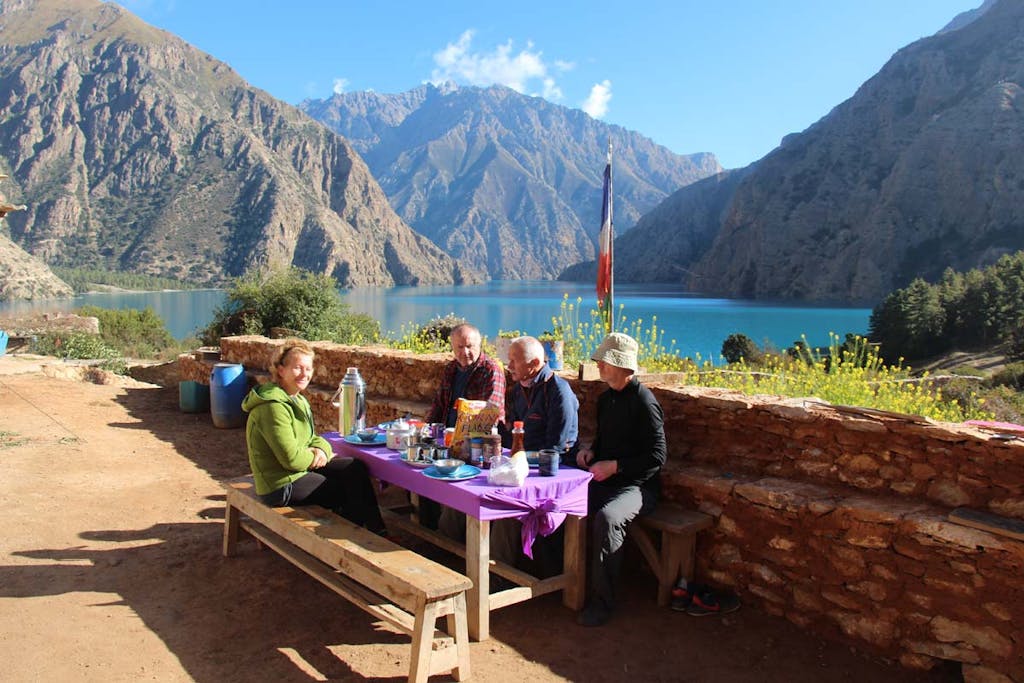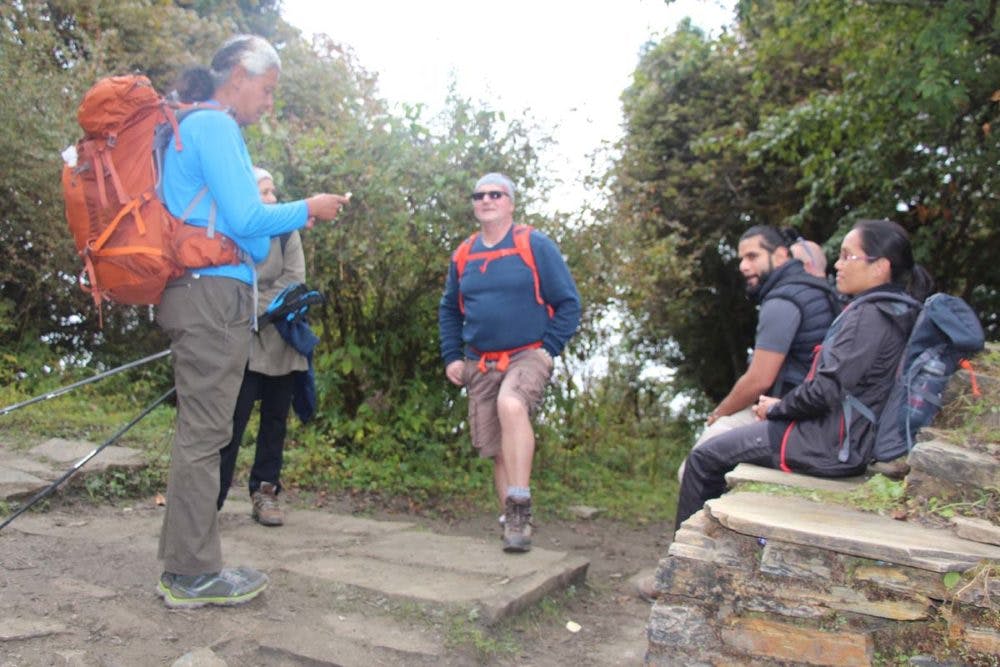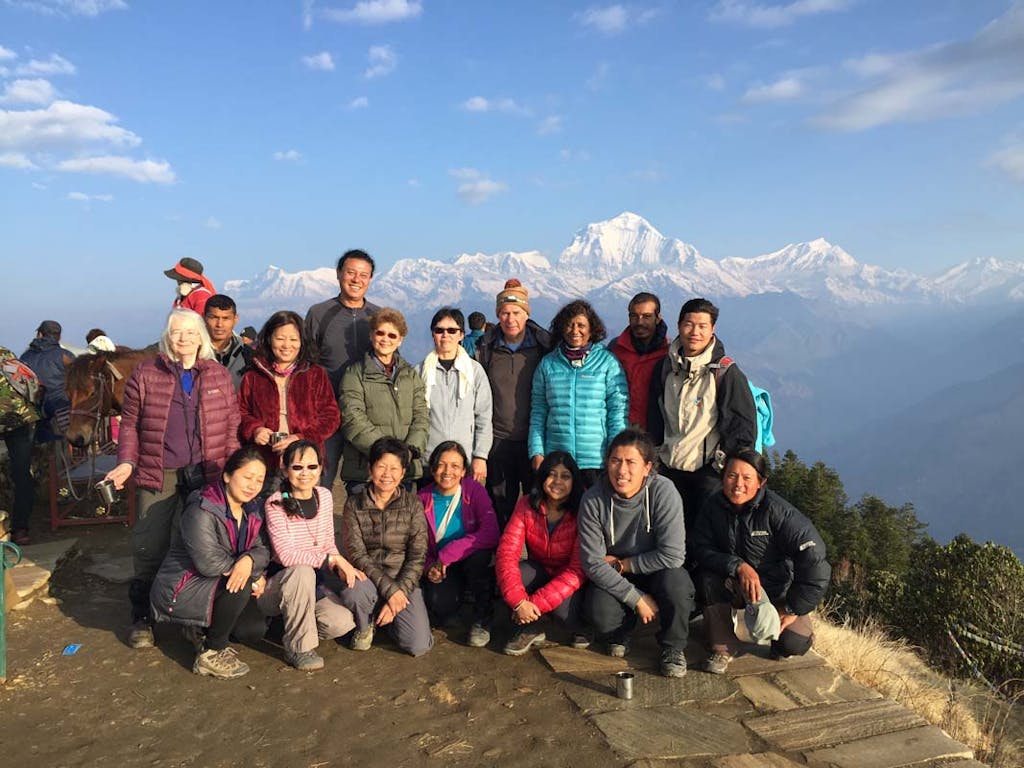Qualities of an excellent trekking guide or trek leader

Qualities of an excellent trekking guide or trek leader.
To be an excellent trek leader, one not only needs to have charisma, knowledge, communication skills, storytelling abilities, and organizational skills; sometimes, you also need to be a father figure, psychologist, counsellor, even mediator, and a mentor to not only to the clients but the support crew as well on infrequent occasions, even a lead manager of crisis and a Wilderness First Responder.
Several “top-notch” City Tour guides were interviewed for their thoughts on Trek leaders’ jobs in a recent recruitment effort. Most were doubtful about their fitness and ability to handle the mountains” hardships and discomforts. They preferred the ‘more cushy” job of guiding in the urban areas with comfortable hotels and good food – basically the “Good easy” life as a guide.
This interview has confirmed our previous belief that great trek leaders are true gems worth their weight in gold.
1. Charismatic personality:
No matter the size of the group, there’s often just one main group leader for each trek and several assistant guides. Unlike in city tours, a trek leader is in charge of making the trekkers happy and looking after his team member’s welfare in the support crew. The clients will not be expecting information but also entertainment. A trekking group leader must have an abundance of charisma, charm, and a great sense of humour is a bonus.
2. Knowledge is paramount:
Charismatic leaders are great, but they cannot have charm alone. A great trek leader needs to know what they are talking about: from facts and figures to the weather forecast for the coming days. Give summaries on the subjects you are talking about and ask the clients if anyone wants to learn more details. Don’t bore them with long talks of history/culture/nature, etcetera.
A great trek leader could be very knowledgeable, but they are not a walking encyclopedia. If asked about something you do not know about – DO NOT MAKE THINGS UP and LIE! Someone in the group will pick up the lie. Once they discover that you have lied: you will lose all credibility, and it does not matter that you did your job exceptionally well for 20 days on a 21-day trek; they will think you must have lied to them throughout the trip. Tell them that you do not have the answer to that particular topic but will update them once you learn more about it. You will receive many “curveballs,” especially early in your career; contemplate how you responded to them and try to handle those situations better the next time.
Nowadays, it is easy on more commercial trials to get wifi connections. You can always search for answers online.

Phoksundo Lake dining
3. Excellent communication skills:
You might have incredible knowledge and outstanding charisma. Still, if you do not have “people skills” to interact with the group, they will probably feel like listening to a pre-recorded tour. Trekking vacation is very different from regular bus tours. Your clients will spend extended periods out of their comfort zone, making them comfortable, chatting, and joking with them. Ask them how things are different from where they come from to where they are. Ask them to speak about themselves, what they do, what they like, etcetera. Most people want to share their passions and favourite things with new friends. Make sure you are paying equal attention to all group members and engaging everyone in participating.
4. Excellent storytelling ability:
Trekkers love to hear about cultures, religious practices, and the history of the region they are trekking in; they like listening to stories. Therefore, a great trek leader needs to be an excellent storyteller. Storytelling is not straightforward; it is down to timing, how long the story is, and much more.
Plan precisely when and where you will tell a particular story, decide how long it should be, and practice it until you know it, like the back of your hand.
Reminder: Storytelling is not making things up – it is the same as lying!
5. Excellent organization skills:
Timing is of the essence when you are leading a trek. You need to be at specific places at specific times; you need to get to where the lunch place has been chosen and to your campsite at the end of the day. The group can only spend a certain amount of time in places for photos, admiration, etcetera. So you have to shepherd the group by giving them enough time to observe & absorb the surroundings at the same time, gently reminding them where they need to reach at the end of the day and hopefully before it gets dark.
Look at the given timings for each day for the hike; if some people take longer, add more time to reach the destination. If most of the group is slower than regular trekkers, start earlier in the morning. If the need arises, make those rest days into hiking days to compensate for their slowness (provided their acclimatization to altitude is not compromised).

Groups resting during a trek
6. Good sense of humour:
It is an asset if you can lighten things up with occasional jokes here and there. For example, making fun of yourself to make the group smile is a safe way to avoid upsetting group members by making jokes about them. In addition, you can add humour to the stories you tell by pointing out a funny situation or lighthearted facts.
7. You must be sensitive:
Not all group members have the same fitness level, and someone might have low self-esteem from being the last person to arrive at the campsite every evening or suffering from diarrhoea or other ailments. An excellent trek leader needs to be sensitive, supportive and encouraging during situations like this. Understanding human psychology and being compassionate can make problem-solving a lot easier.
8. You need to think on your feet:
As a trekking guide, you need to be spontaneous. Your day can be unpredictable; the weather can quickly change, bridges might be washed away, landslides can block trails, and things can be very different from the last time you trekked in this area. Therefore, being creative at improvisation, prepared, and flexible is essential. It will take time to plan for every situation, but the most important thing is learning from every experience.
On trekking tours, people usually have raincoats, first aid kits, hiking poles, jackets, etcetera, which can be improvised to help the injured or find an alternative option.
9. A good sense of direction:

Trekking group at Poonhill
It may seem obvious, but some trek leaders do not understand direction well or panic in a stressful situation. You have to be prepared for any conditions you might face while in the mountains, away from medical facilities, phone networks, transportation, etcetera. Often, your trekkers depend on your local knowledge and language skills to help you get through a situation. In addition, your clients will remember you for your problem-solving skills.
10. You must be passionate about being a trek leader:
If you do not love what you do or don’t like providing an experience with new people, then leading treks is not the right profession for you.
Customers are paying for an unforgettable experience; they should never know whether this is trek number 1 or trek 1000 for you.
A genuine passion for your work will shine through, so always remember to share that with your clients. It will reflect on the reviews they give on their trip experience.
Content by Raj Tamang – Founder and Artisan of Boutique Adventure Experiences.
Check out our Trekking packages for Nepal, Bhutan, India, and Tibet.
